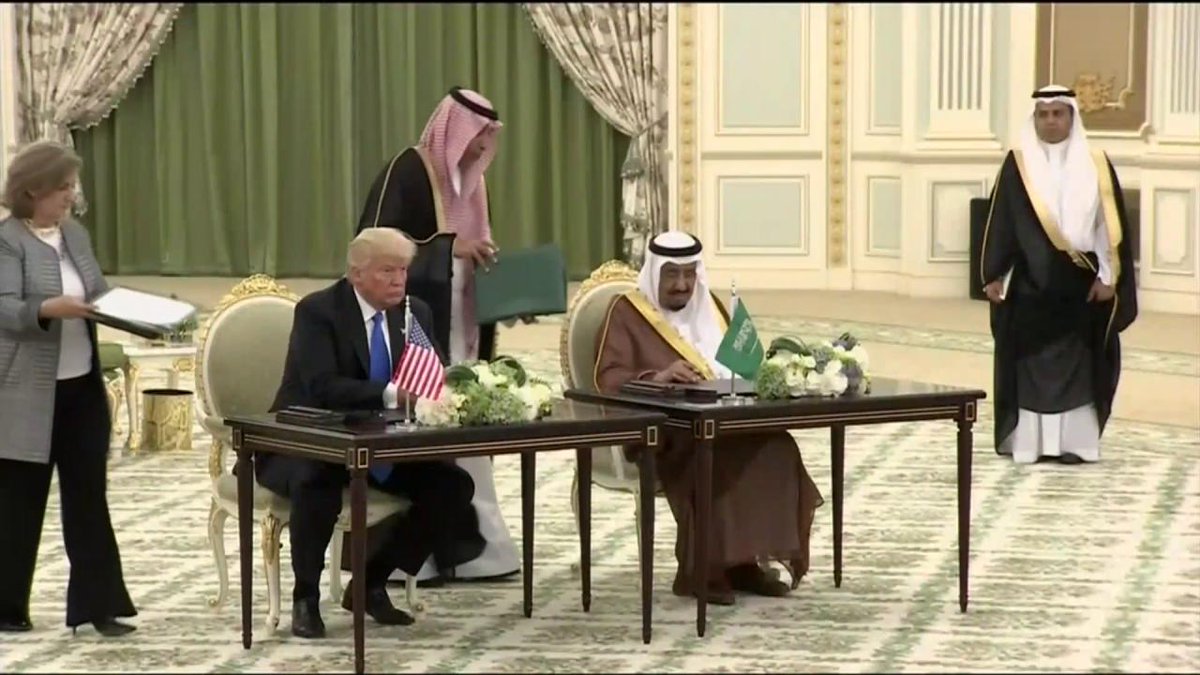
One of president Trump’s economic crown jewels of his nine-day international, get-away-from-it-all tour has to be the signing of a series of agreements with the Saudis — agreements which include a military sales deal of “about $110 billion, effective immediately, plus another $350 billion over the next 10 years.”
Also included in the agreements is a defense cooperation agreement intended to create “tens of thousands of new jobs in the U.S. defense industry.”
While the creation of “tens of thousands” of new defense jobs remains to be seen, the $110 billion worth of Foreign Military Sales (FMS) appears real.
According to the New York Times, the president’s son-in-law, Jared Kushner, played a significant role in cementing the deal by hosting a high-level delegation of Saudis in Washington and facilitating the sale of one item of the FMS package — “a sophisticated radar system designed to shoot down ballistic missiles” – by calling Lockheed Martin’s CEO, Marillyn A. Hewson, whose company makes the radar system, and asking her “whether she could cut the price.” Ms. Hewson said she would look into it.
Today, the State Department released a “fact sheet” outlining the purpose and content of the package.
The purpose of the package, according to State, is to significantly expand the more than seven-decade long security relationship between the United States and the Kingdom of Saudi Arabia, by supporting the Kingdom’s defense needs and the “long-term security of Saudi Arabia and the Gulf region in the face of malign Iranian influence and Iranian related threats.”
In addition, it bolsters the Kingdom’s ability to continue contributing to counterterrorism operations across the region, reducing the burden on U.S. military forces and, according to State, the package “demonstrates the United States’ commitment to our partnership with Saudi Arabia, while also expanding opportunities for American companies in the region, potentially supporting tens of thousands of new jobs in the United States.”
The following is a description of the package:
The intended sales fall broadly into five categories: border security and counterterrorism, maritime and coastal security, air force modernization, air and missile defense, and cybersecurity and communications upgrades. Included are offers of extensive training and support to strengthen our partnership and the Saudi armed forces.
Collectively, they present the opportunity to significantly augment the Kingdom of Saudi Arabia’s capabilities to help deter regional threats and enhance its ability to protect its borders and contribute to coalition counterterrorism operations.
Border Security and Counter Terrorism: Capabilities such as aerostats, tanks, artillery, counter-mortar radars, armored personnel carriers, helicopters, and associated training that will enable Saudi Arabia to secure its borders against terrorist and other threats.
Maritime and Coastal Security: Capabilities that will enable Saudi Arabia to defend freedom of navigation and to deter and defend against maritime attacks or incursions. Systems include Multi-Mission Surface Combatant ships, helicopters, patrol boats, and associated weapons systems.
Air Force Modernization: Systems, sustainment, and training that will enable Saudi Arabia to maintain airborne surveillance, secure its airspace, and provide close air support with improved precision targeting capabilities and processes. Systems include transport, light close air support, intelligence-gathering aircraft, and continuing support for its existing platforms.
Air and Missile Defense: Systems such as Patriot and THAAD that will help Saudi Arabia protect itself and the region from missile or other airborne attacks.
Cybersecurity and Communications: Equipment that will modernize Saudi Arabia’s command and control networks across its military to improve its overall cohesion and operational effectiveness.
Lead Image: President Trump and Saudi Arabia’s King Salman about to sign the arms deal. (White House photo)
[Edited]
















